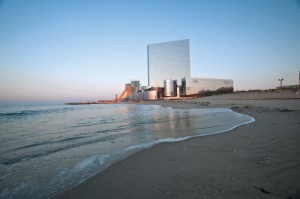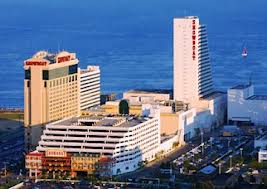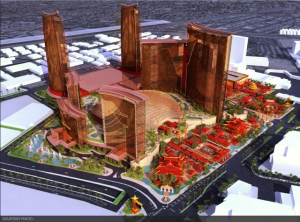Reality continues to sink in at Revel, where Glenn Straub has thrown in the towel on reopening this summer — raising the prospect of a grand- reopening in the cold-weather months. Not very auspicious, that. Labor Day is the target date for getting the amenities back online and even that is a tentative date. Unable to get electrical power from other sources, Straub will continue his shotgun wedding with ACR Energy Partners for the foreseeable future. “They’re putting roadblocks up,” he complained.
reopening in the cold-weather months. Not very auspicious, that. Labor Day is the target date for getting the amenities back online and even that is a tentative date. Unable to get electrical power from other sources, Straub will continue his shotgun wedding with ACR Energy Partners for the foreseeable future. “They’re putting roadblocks up,” he complained.
Meanwhile, Straub finds himself in the middle of a legal wrangle between Stockton University and Caesars Entertainment over the botched Showboat sale. At issue is a covenant — which Caesars  allegedly promised to remove — with Trump Entertainment Resorts, requiring that the property be operated as “a first-class casino.” (An empty victory for TER.) But Caesars went and removed the gaming entitlement from the property, meaning that it could neither be run as a casino or not operated as one. Thus Straub, who bought the Showboat from Stockton, finds himself stuck with a $22 million turkey.
allegedly promised to remove — with Trump Entertainment Resorts, requiring that the property be operated as “a first-class casino.” (An empty victory for TER.) But Caesars went and removed the gaming entitlement from the property, meaning that it could neither be run as a casino or not operated as one. Thus Straub, who bought the Showboat from Stockton, finds himself stuck with a $22 million turkey.
In its lawsuit, “the university charged Caesars with breach of contract and fraud, saying the casino operator negligently concealed material facts,” according to the Las Vegas Review-Journal. Despite its frequently stated fear that college kids “will sneak into the [Trump] Taj Mahal to gamble and drink,” it is worth remembering that TER had no such scruples when it tried to sell Trump Plaza to Stockton U. Whatever the outcome of the lawsuit, it looks like there will be no winners, only losers.
(Meanwhile, Hard Rock International — having long since given up on Atlantic City — is teaming with the Meadowlands on a casino proposal. At a voluntary tax rate of 55%, Hard Rock claims the megaresort could generate $300 million a year in taxes. We’ll know more next week.)
* Now, from a lose/lose proposition to somewhat of a win/win scenario. Morgan Stanley has been delving into Vegas-visitor stats and  discovered a significant overlap between Sin City and Macao. As VIP players avoid the latter like the plague, the survey “pointed to a larger-than-expected overlap in Macau and Vegas gamblers: over the previous 12 months, 33 percent of Chinese gamblers had gambled in Vegas, and 57 percent of Macau gamblers had also been to Vegas.” That’s not only good news for existing Las Vegas Strip operators but for Genting Group, which is hoping that the kitschy chinoiserie of Resorts World Las Vegas (above) will strike some nostalgic chord with Chinese punters (some 8% of whom have essentially gone into hiding in the last year).
discovered a significant overlap between Sin City and Macao. As VIP players avoid the latter like the plague, the survey “pointed to a larger-than-expected overlap in Macau and Vegas gamblers: over the previous 12 months, 33 percent of Chinese gamblers had gambled in Vegas, and 57 percent of Macau gamblers had also been to Vegas.” That’s not only good news for existing Las Vegas Strip operators but for Genting Group, which is hoping that the kitschy chinoiserie of Resorts World Las Vegas (above) will strike some nostalgic chord with Chinese punters (some 8% of whom have essentially gone into hiding in the last year).
However, the Wall Street boffins suggest that the ongoing anti-corruption campaign in China could chill visitation to Las Vegas, as high rollers try to avoid drawing attention to themselves. Thus, Morgan Stanley is reversing its prognostication of a 2% increase in Vegas visitation to a 2% decline. Chinese players are particularly critical to MGM Resorts International, which counts on them for 80% of its Strip play. Presumably it, like other Macanese operators, are participating in recent cross-marketing efforts to get their Chinese patrons playing in low-tax Nevada rather than Macao with its 39% rate.

